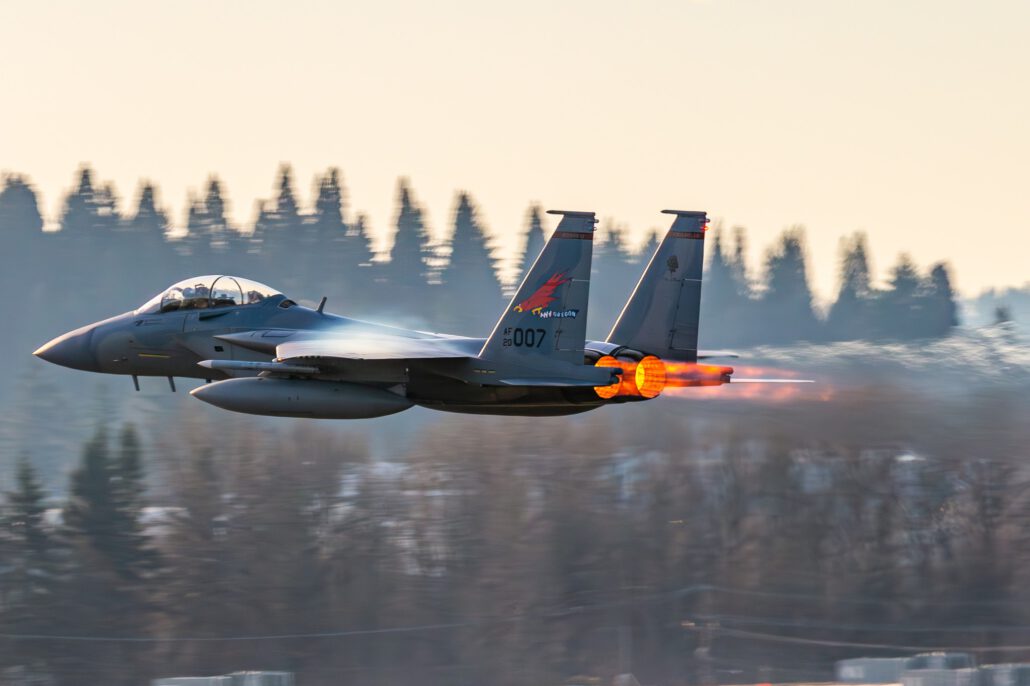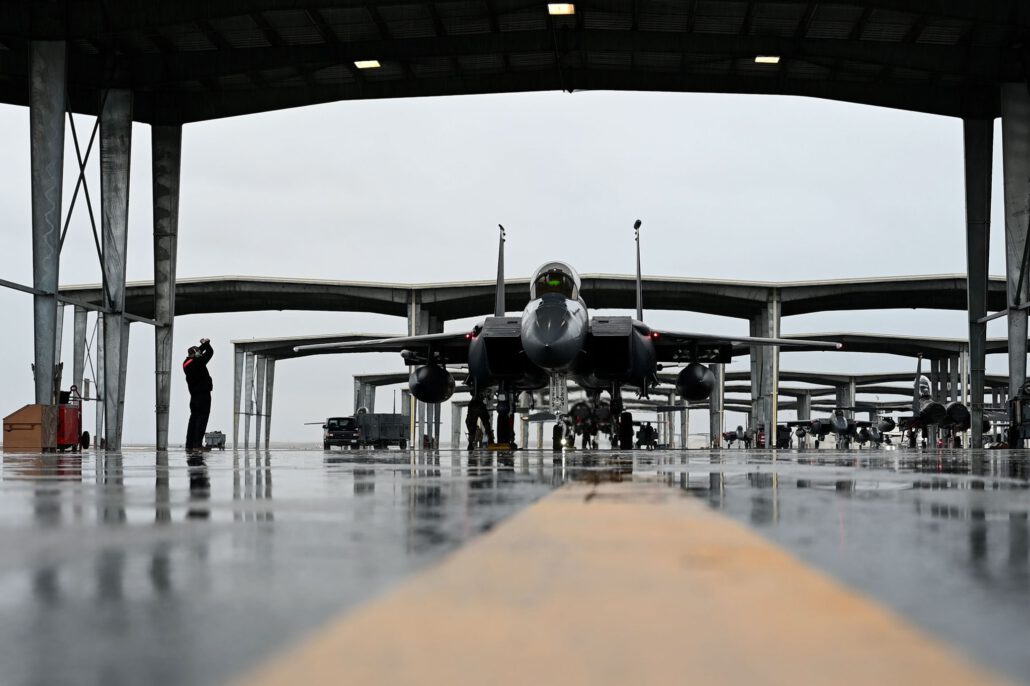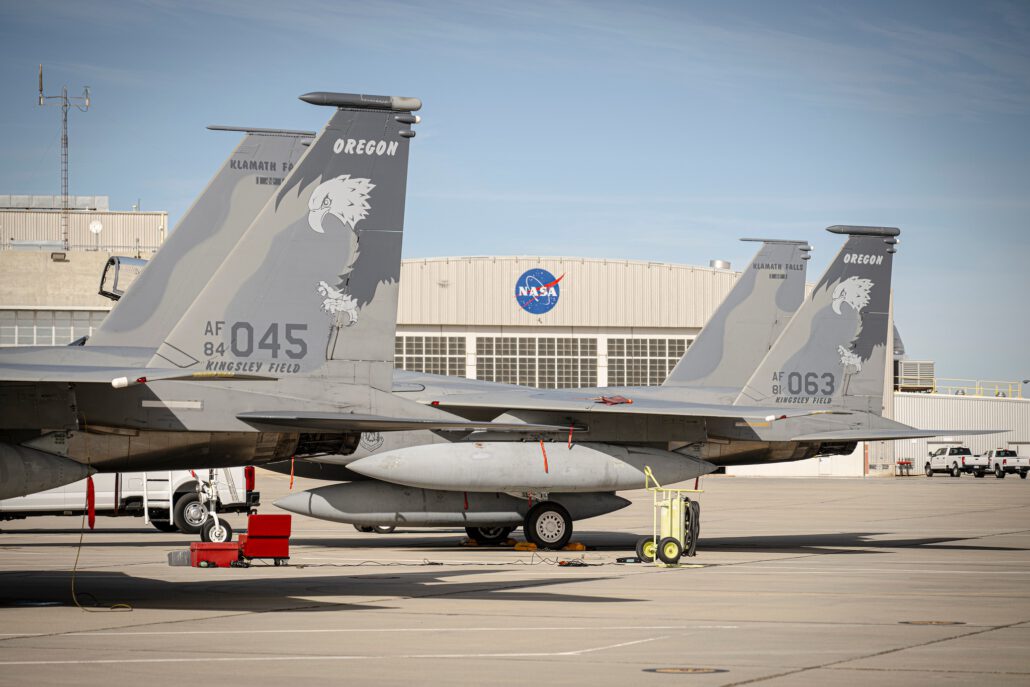By 1st Lt. Savanah Bray,
The F-15EX – both 001 and 002 – have taken to the Alaska skies for exercise Northern Edge 21, May 3-14.
The purpose of the F-15EX’s participation in Northern Edge is to allow for immediate deep-end testing in a complex jamming environment to gather essential test data for what works and what needs improvement. This is critical to expose the F-15EX to this environment now to make changes early on and allow for an aggressive test and fielding timeline.
“At Northern Edge we’re assessing how the F-15EX can perform in a jamming environment, to include GPS, radar and Link 16 jamming,” said Maj. Aaron Eshkenazi, F-15EX pilot, 85th Test and Evaluation Squadron. “The other main goal is assessing the EX’s interoperability with fourth and fifth-generation assets. With more than 60 aircraft airborne during every vul (vulnerability period – the period of time when an aircraft is vulnerable to harm) at Northern Edge, we’re putting the jet in the role it will perform in once it’s fielded, and seeing how it does. So far, it’s been performing really well.”
While at Northern Edge, F-15EX pilots, test engineers and others from both the 85th TES, 53rd Wing and 40th Flight Test Squadron, 96th Test Wing, are gathering test data points and accomplishing test objectives, to include:
- Performance of technological advancements and subsystems, such as the advanced cockpit system, large area displays, and the new helmet, the digital Helmet Mounted Cueing System for the F-15EX
- Eagle Passive Active Warning Survivability System performance defending both the F-15EX itself and other joint fourth- and fifth-generation platforms
- Overall radar performance
- Interoperability with other platforms
“As an Air Force, we are charged by the CSAF (Gen. Charles Q. Brown, Jr.), to accelerate change; by bringing the F-15EX to Northern Edge already, we are getting after that objective,” said Col. Ryan Messer, 53rd Wing commander. “Northern Edge is the ideal initial stress test for the platform, and we are fully integrating it just like any other aircraft participating. The objective of operational tests isn’t for everything to go perfectly, but to identify what needs improvement, and Northern Edge, with its opportunities for fourth-fifth generation integration in a complex range environment, will show us exactly that.”
Eshkenazi explained the F-15EX is able to come to an exercise like Northern Edge and safely participate in an operationally complex and dynamic environment because it’s not an altogether new platform. Much of the initial testing typically required on a new platform was accomplished during flight tests of the other versions of the F-15. This has also allowed for seamless integration between developmental and operational tests between the 53rd Wing, 96th Test Wing, and the Air Force Reserve Command’s 84th Test and Evaluation Squadron.
“Getting F-15EXs to Northern Edge on time to support the exercise was a massive undertaking by all involved given the tight timelines between aircraft delivery and now,” said Maj. Brett Hughes, F-15EX pilot, 40th Flight Test Squadron. “Despite arriving at Eglin (AFB) less than one and a half months ago, and less than two weeks ago for EX-2, both aircraft arrived in time for Northern Edge 21. This speaks volumes about the integrated test effort and the confidence we have in the platform to deliver combat capability from the start. The end of the exercise will represent just the beginning of EX testing, but proves the rapid test efforts of DT/OT (developmental testing/operational testing) integration and showcasing innovation through integration.”
During Northern Edge, some pilots are flying the F-15EX for the second time ever, which showcases how smooth the transition is from the F-15C to the F-15EX. Furthermore, the F-15EX is flying with Suite 9.1 “X,” a version of Operational Flight Program Suite 9.1, which is comparable to Suite 9.1 “RR” that F-15Es and F-15Cs are currently testing and preparing to field.
Northern Edge 21 is a U.S. Indo-Pacific Command exercise designed to provide high-end, realistic war fighter training, develop and improve joint interoperability, and enhance the combat readiness of participating forces. This is done by providing a venue for large-force employment training and multi-domain operations; tactical training for the full spectrum of conflict; execute and advance adaptive basing joint tactics, techniques, and procedures; advance live-virtual-constructive capabilities; and support U.S. Indo-Pacific Command’s experimental initiatives. The F-15EX’s participation supports the development of many of these objectives.


